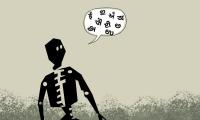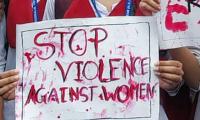When the US-led coalition forces announced the formation of a 25-member governing council for Iraq in July 2003, a young Shia cleric denounced the members as "unbelievers" and sought volunteers for an army to "fight the American and British occupiers".
Muqtada al-Sadr told thousands of supporters at a mosque in Najaf, south of Baghdad, on July 18 that this army would use "peaceful means" to evict the Western forces.
In October, al-Sadr -- whose claim to power comes from his father Muhammad Sadiq al-Sadr, a revered and powerful ayatollah killed by former Iraq president Saddam Hussein's regime in 1999 -- followed this up with the declaration of a shadow cabinet for the country. Most of his supporters come from poor Iraqis living in al-Sadr city in Baghdad, formerly known as Saddam City, but renamed after the US invasion in memory of his father.
"I have decided and I have formed a government made up of several ministries, including ministries of justice, finance, information, interior, foreign affairs, endowments and the promotion of virtue and prevention of vice," al-Sadr, 30, told worshippers at Friday prayers on October 10.
"The first step shall be through mass demonstrations, which will be followed by a referendum and free elections to vote for the suggested government," he said.
The Shia community in Iraq, which was suppressed under Hussein's regime, has generally welcomed the invasion. However, the demands for an Islamic government in Iraq has many takers in the community, and the al-Sadr faction seems more organised than others. He is also said to have the backing of many local sheikhs and leaders who resent the American presence in Iraq.
But the Americans favoured dealing with Grand Ayatollah Ali al-Sistani, a moderate septuagenarian cleric whose demand for direct elections in Iraq struck a chord among the Shia community.
An angry al-Sadr grew more strident, and in February declared that his army, now said to be over 15,000 strong, was the "enemy of the occupation".
In late March, the coalition government shut down al-Sadr's weekly newspaper, Al Hawza, on the grounds that it incited violence against the coalition forces.
That, and the news that one of al-Sadr's close aides, Mustafa al-Yacoubi, had been arrested for the murder of a rival Shia cleric, sparked off a chain of protests and violence across the country.
At least 20 people were killed and over a hundred injured when al-Sadr's supporters besieged the coalition base in Najaf on Sunday. These included two soldiers, one American and the other from El Salvador.
Battles between his supporters and coalition troops killed at least 52 Iraqis and nine coalition troops, including eight Americans, over the weekend.
Also early Sunday, al-Sadr's militia occupied the governor's office. They left only after the British troops occupying the city issued an eight-hour ultimatum, but threatened that they would return.
In a statement issued on Sunday, al-Sadr -- who is said to be hiding in a mosque in Kufa, southern Iraq, guarded by his loyalists -- called for his followers to "terrorise your enemy".
"There is no use for demonstrations, as your enemy loves to terrify and suppress opinions, and despises peoples," he said. "I ask you not to resort to demonstrations because they have become a losing card and we should seek other ways. Terrorise your enemy, as we cannot remain silent over its violations."
On Monday, the American administrators in Iraq declared al-Sadr an outlaw, and signed a warrant for his arrest.
"He is attempting to establish his authority in the place of the legitimate authority. We will not tolerate this... We will reassert the law and order that the Iraqi people expect," declared the head of the coalition provisional authority Paul Bremer, who hastily cancelled a trip to Washington following the unrest.
"I'm accused by one of the leaders of evil, Bremer, of being an outlaw... if that means breaking the law of the American tyranny and its filthy constitution, I'm proud of that and that is why I'm in revolt," responded al-Sadr in a statement.
On Tuesday, two civilians were killed and 11 Italian soldiers wounded in clashes with al-Sadr's men in Nassiriya, southern Iraq. The clash followed two days of unrest in the city.
Though playing it down and refusing to classify it as a Shia uprising, the US forces, already contending with a fierce Sunni uprising across the nation, now have another front to tackle.
"Can the Sadrists maintain their political momentum?" asks Dr Juan R I Cole, professor of Modern Middle East and South Asian History at the University of Michigan.
In a paper titled 'The United States and Shi'ite Religious Factions in Post-Ba'thist Iraq' late last year, he argued, "If the Defence Department scenario comes to fruition, and Iraq holds relatively free and fair elections in late 2004 or early 2005, the Sadr Movement's political power may be diluted in a new Iraqi parliament that they cannot hope to dominate. Assuming they agree to field candidates, they could only hope to play in it the sort of role that the Lebanese Hizbullah does in the Lebanese parliament, where the radical party is often forced to cooperate with the Maronite Christians and other forces.
"If, on the other hand, Iraq begins to collapse into insecurity and angry urban crowds seek an early exit of coalition forces, the Sadr Movement networks and militias will stand them in good stead in asserting power in East Baghdad and the south. It seems clear that the future of Iraq is intimately wrought up with the fortunes of the Sadr Movement," he concluded.








